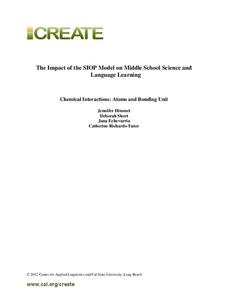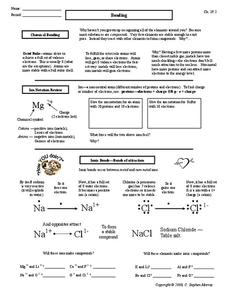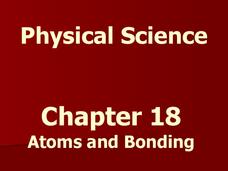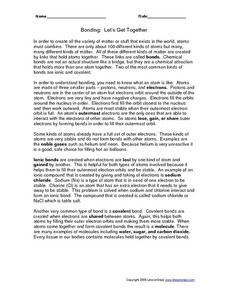Curated OER
Bonding
In this bonding worksheet, high schoolers read about the octet rule in bonding, ion notation, ionic bonds, covalent bonds and oxidation numbers. Students write 2 ion notations, they determine if 8 sets of ions will make compounds, they...
Curated OER
Chemical Formula Practice #1/Bonding Basics Practice Page
The first of two worksheets methodically prepares chemistry novices for naming polyatomic compounds. It begins by having them acknowledge the number of each atom contained in a molecule. Then learners list the valence electrons for a...
LABScI
Atomic Structure and the Periodic Table of Elements: The Secret Agent Lab
Food always gets attention! Model atomic structure using fruit loops to represent the subatomic particles. After building models, scholars create ionic bonds using their models. Finally, they use these concepts to create a periodic table.
Curated OER
Naming and Covalent Compounds
In this naming and covalent compounds worksheet, learners name 12 compounds using a chart of polyatomic ions if needed. They also draw covalent bonds in 6 compounds and answer 6 questions about ionic bonds, covalent bonds and polyatomic...
Curated OER
Types of Bonding Lab
Chemistry lab learners experiment to identify a series of unknown compounds. They choose which tests to perform, but you may suggest melting or boiling point, solubility, electrical conductivity, and malleability. This is a terrific...
Curated OER
Why and How Atoms Combine
Here is a top-notch handout to supply your chemistry class with. It covers valence electrons, Lewis diagrams, the octet rule, and more! Technically it is less of a worksheet than a detailed explanation of these chemical bonding concepts....
Curated OER
Chemistry of Life Study Guide
Biology learners should understand a few chemistry basics. Here is a worksheet that introduces them to the concepts of chemical reactions, molecular bonding, and the unique combination of properties that make water vital to life....
Curated OER
Classifying Chemical Reactions
Summarize your topic of chemical reactions with this short presentation about classifying and the properties of different reaction types. Your students should be able to name the reaction types, identify the ions involved, and write the...
American Chemical Society
Represent Bonding with Lewis Dot Diagrams
Lewis dot diagrams, Lewis dot structures, and electron dot diagrams are all the same thing. Young scientists learn how to draw Lewis dot diagrams and come to understand how dots and dashes represent valence electrons and ionic or...
Curated OER
Physical Science Review Questions
Prepare your class for a quiz with these physical science review questions. Learners respond to 7 questions about ionic and covalent bonds, oxidation states, and chemical and physical changes. In addition, they name compounds and balance...
Curated OER
Atoms and Elements: An Introduction
Students are able to discuss the difference between a proton, a neutron and an electron. They also can explain the difference between an ionic and a covalent bond. Students know the main structure of atoms and molecules. Student are able...
Center for Applied Linguistics
Chemical Interactions: Atoms and Bonding
Watch budding chemists interact with the resource on chemical interactions. In the unit, six lessons provide an overview of basic chemistry, from understanding the development of atomic theory to distinguishing between ionic and covalent...
Curated OER
Chemical Bonding
Students classify compounds as ionic or covalent. In this chemical bonding lesson plan, students experiment with 6 chemical compounds. They test physical properties such as the melting point, the solubility and the electrical...
Curated OER
Chemical Bonding and Shapes of Molecules
In this chemical bonds worksheet, students review the different types of bonds, Lewis dot structures, ions, and molecule shapes. This worksheet has 10 matching, 17 multiple choice, and 3 drawing questions.
Curated OER
Worksheet-Bonding
For this bonding and electron configuration worksheet, students answer 9 multi-part questions including identifying the differences between bond types, drawing Lewis structures for atoms and identifying types of bonds in molecules.
Curated OER
Bonding
In this bonding learning exercise, students read about the two different types of chemical bonding: ionic and covalent bonds. Students review ion notation and oxidation numbers. This learning exercise has 24 fill in the blank, 2...
National Institute of Open Schooling
Chemical Bonding
Name is Bond, covalent bond. Through readings and answering questions, classes explore the different types of chemical bonds, their characteristics, valence shell electron pair repulsion theory, and atomic orbitals.
Mr. E. Science
Atoms and Bonding
I don't trust atoms because they make up everything. Budding scientists learn about famous scientists connected to atomic models, chemical, ionic, and hydrogen bonds. The presentation also presents how to count atoms in an equation,...
Curated OER
WS 7.1.3 Molecular and Ionic Compounds
In this compounds activity, students name ionic and molecular compounds given their formulas. They also write the formulas for molecular and ionic compounds given their names.
Curated OER
More Chemical Bonding
In this chemical bonding worksheet, high schoolers review the three types of bonds including ionic, covalent and polyatomic compounds. They identify 8 compounds as ionic, covalent or polyatomic and they make 4 ionic compounds and they...
Curated OER
More Chemical Bonding
In this chemical bonding worksheet, students review the three types of compounds: ionic, covalent, and polyatomic. Students practice drawing the covalent bonds of given compounds. This worksheet has 5 drawings and 13 fill in the blank...
Curated OER
Ionic vs. Covalent Compounds Lab
In this ionic and covalent compound worksheet, students investigate the properties of three unknown substances in order to determine if they are ionic or covalent compounds. They write conclusions about their results.
Curated OER
Bonding: Let's Get Together
In this atom instructional activity, students read 5 paragraphs about ionic bonds. Students answer 2 true/false questions, 4 fill in the blank, 3 multiple choice, and 1 short answer question.
Curated OER
Section 4.2: Ionic and Covalent Bonding
There are only six short answer questions on this assignment. Chemists explain electrical conduction properties of salt, salt water, and gold. They compare ionic and covalent bonds. The explain bond strengths. Perhaps you could use this...
Other popular searches
- Ionic and Covalent Bonding
- Ionic Covalent Bonding
- Ionic vs. Covalent Bonding
- Ionic vs Covalent Bonding

























